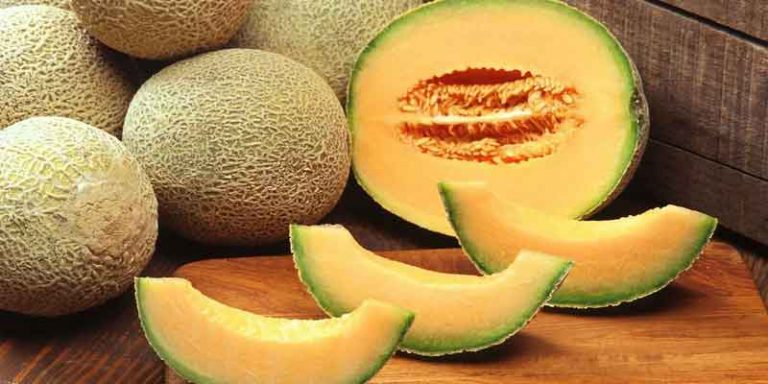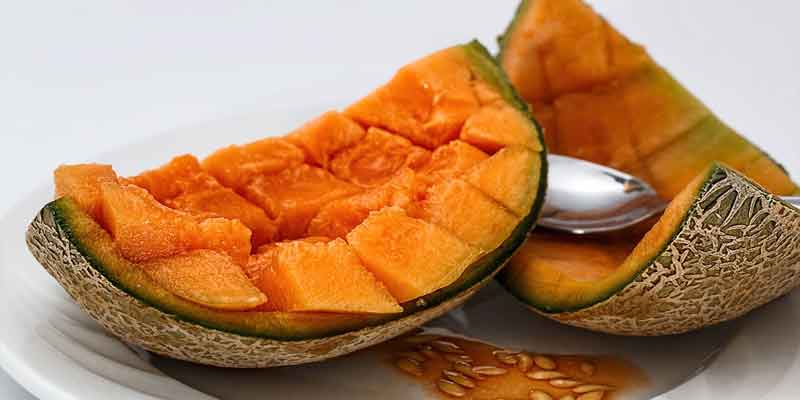Cantaloupe is a tropical fruit that grows during only the warmer season. These fruits are a popular food due to their versatility. These tasty melons are great for salads, smoothies, cooking, or just eating them fresh. While they are only available once a year, you may find yourself wanting to eat them throughout the year. Therefore, can you freeze cantaloupe?
Can You Freeze Cantaloupe?
Yes, you can freeze cantaloupe. These melons are great for freezing and they freeze very well for a long time. Frozen cantaloupe are great for eating fresh, using them in your favorite smoothies, or use them in cooking to enhance the flavor of a meal.
The fruit should be frozen as chunks or puree only. Avoid freezing the whole cantaloupe in the freezer. The fruit will take a long time to freeze and when it does, the inside of it will become mushy. When it thaws and you try to cut it open, it will just be a mess.
Freezing the cantaloupe will change their texture a bit when it’s frozen. It will become slightly mushy and sometimes can be a bit slimy.
Therefore, the melons won’t be as fresh by having a firm texture as they did before it was frozen. Cantaloupe that is frozen is best for food that requires blending and mixing such as smoothies, ice cream, or cooking a meal.
How to Freeze Cantaloupe
Cantaloupe melons are great for freezing due to their high water content. Depending on what you’ll be using the fruit for, you have two options to prepping them for the freezer.
Below are two methods on how to prepare and freeze cantaloupe:
Freezing Fresh Cantaloupe
Us this method if you’re planning to use cantaloupe to use in cooking, smoothies, or eating them fresh.
- Slice the cantaloupe in halves.
- Scoop out the seeds from the inside of the melon.
- Use a sharp knife and peel the rind off the cantaloupe.
- On a tray, place a sheet of wax paper on it.
- Cut the yellow flesh into chunks and place them on a tray.
- Sprinkle some sugar over all the melons. The sugar helps preserve the color and flavors.
- Put the tray into the freezer and let it sit for about 2-3 hours.
- Once it’s completely frozen, immediately transfer them to an airtight container or freezer bag.
- If you’re using a freezer bag, squeeze out as much air as can and seal the bag tight. For airtight container, make sure the lid is sealed tight.
- Label the container or bag and place it into the freezer.
Freezing Cantoulope Puree
This method is great for making smoothies and other drinks. It’s simple and will last in the freezer for a very long time.
- Cut the cantaloupe open in halves.
- Scoop out all the seeds from the melon.
- Using a sharp knife, peel the rind off the cantaloupe.
- In a blender, place all the melons into it.
- Blend them until you get the preferred consistency.
- In a clean ice cube tray, pour the puree into each slot. Be sure to not overfill each slot.
- Place the ice tray into the freezer for about 2-3 hours.
- Once it’s completely frozen, remove them from the freezer.
- Immediately transfer the ice cube to a freezer bag.
- Squeeze out as much air as you can and seal the bag tight.
- Label the freezer bag with a date and place them back into the freezer.
Besides freezing just the cantaloupe itself, you can make a tasty fruit capote by mixing watermelon and honeydew with the cantaloupe.
How Long Can You Freeze Cantaloupe?
Cantaloupe will last for 10 to 12 months in the freezer. This is if it’s prepared correctly first and stored properly.
While these melons will remain fresh for up to a year, they will last much longer than that. However, the quality of the cantaloupe will start to diminish. This is due to the melon suffering from freezer burn when it’s stored in the freezer for a prolonged time.
Therefore, for the best taste quality, it’s recommended to eat them within a year.
How Do You Defrost Cantaloupe?
To defrost cantaloupe that you have stored in the freezer, remove the entire container, and place them in the refrigerator for about 6 to 8 hours.
Never leave the frozen cantaloupe to thaw at room temperature. Doing so will cause the melon to lose its texture and taste.
If you’re planning to use cantaloupe for smoothies, ice creams, or adding to a cooked meal, you won’t need to thaw them. Simply remove the amount of frozen cantaloupe that you need and place them directly in the blender for making smoothies and ice creams.
For cooked meals, place them into the pan while it’s cooking. The frozen melon will melt instantly and give your meal a boost in flavor and texture.
Can Frozen Cantaloupe Go Bad?
Frozen cantaloupe can go bad if it’s left in the freezer for a prolonged time or when it’s left to thaw for a long time.
In the freezer, cantaloupe has a shelf life of about 1 year. This means the fruit will best at best quality if used within that time. However, if it’s stored properly, cantaloupe can stay frozen indefinitely. The only problem you’ll have once they passed their shelf life in the freezer, the quality of the melon will slowly diminish.
After a year, before eating it, check to see if the cantaloupe still has some flavors to it. If it tastes bland, they should just be thrown away.
Once the cantaloupe has been in the freezer for 2 years, the fruit should just be thrown away or used in organic compost. By now, the flavor and texture will degrade so much that all there’s left is a piece of ice.
As for thawing, the cantaloupe can go bad if it’s left to thaw for a long time. These melon have a soft texture and it will defrost rather quickly.
Leaving them to thaw for a long time could cause them to become soggy and watery.
Therefore, if you’re planning to use cantaloupe to cook with or use in smoothies, simply take as much of the melon you need and place them directly into the meal.
If you do need to thaw them, place them in the refrigerator so it’ll thaw slowly which will prevent texture and flavor loss.
Related Questions
Can you freeze cantaloupe seeds?
The seeds of the cantaloupe can be frozen. Storing them in the freezer will keep them fresh for a long time. These seeds are edible and you can roast them in the oven straight from the freezer. Cantaloupe seeds are great for adding to salads, stews, smoothies, and soups.
Can you eat cantaloupe rind?
Cantaloupe rind is similar to those of watermelon. The rind is thick and not intended to be eaten.


